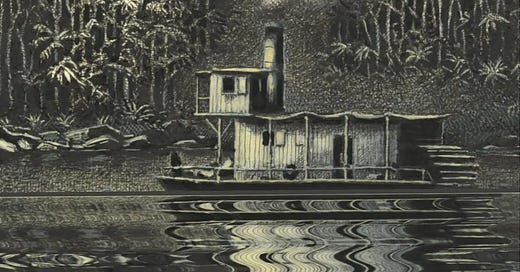Why You Should Read 'Heart of Darkness'
Three takeaways from Joseph Conrad’s phycological thriller
Joseph Conrad’s phycological thriller, Heart of Darkness, transports us to the time of Belgium’s King Leopold II and his pillage of the Dark Continent. This was, in Conrad’s memory, “… the vilest scramble for loot that ever disfigured the history of human conscience and geographical exploration." The following represents three takeaways from this classic of historical fiction.
The Outskirts of Madness
This literary trip into the Belgian Congo is a spectacle of utter madness; a place where sane men would come home “scientifically interesting,” that is if they came home at all. Even on the outskirts of the absentee ruler’s domain, there was a horrific sort of chaos and inefficiency. Massive holes would be ordered dug for no discernable purpose; company men were happy to carry water in punctured pails; and idle brickmakers would refrain from ever making a single brick. Unrepaired steamers were left to rot in the jungle, with steel plates being available for repairs but no rivets to fasten them! All the while, cases of rivets were bursting at their seems upriver. One could kick a loose rivets on the ground there, or fill their pockets by just stooping down, but there were none to be found where they were needed. “It was an inextricable mess of things decent in themselves but that human folly made look like the spoils of thieving.”
And almost in a parody of itself, there was the self-dubbed Eldorado Exploring Expedition.
“Their talk, however, was the talk of sordid buccaneers: it was reckless without hardihood, greedy without audacity, and cruel without courage; there was not an atom of foresight or of serious intention in the whole batch of them, and they did not seem aware these things are wanted for the work of the world. To tear treasure out of the bowels of the land was their desire, with no more moral purpose at the back of it than there is in burglars breaking into a safe.”
Light from the Dark Ages
Interestingly, the narrator compares the colonization of Africa to the Roman conquests of Gaul and those lands beyond, when they remained in barbarism, alluding to our civilization as being an unforeseeable beneficiary of some other voyage into darkness. In that way, Conrad creates a clever play on words for the “Dark Continent,” contrasting the Dark Ages with the Age of Enlightenment.
“I was thinking of very old times, when the Romans first came here, nineteen hundred years ago--the other day. . . . Light came out of this river since--you say Knights? Yes; but it is like a running blaze on a plain, like a flash of lightning in the clouds. We live in the flicker--may it last as long as the old earth keeps rolling! But darkness was here yesterday.”
And who can know what kind of madness may have ensued from those early voyages into the darkness. It is in this “lightless region of subtle horrors, where pure, uncomplicated savagery was a positive relief, being something that had a right to exist—obviously—in the sunshine.”
Cults, and Counterfeit Light
Heart of Darkness carries its reader upriver on a full-steam-ahead pace, which seldom strays from its solitary destination, or person I could say, and that is Kurtz. Intentionally so, the man Kurtz appears to be an embodiment of European colonialism, being of German, English and French descent and being the most well respected man in this Belgian enterprise.
Kurtz himself is described as a truly gifted leader, who has a cult-like following amongst the Europeans and the natives alike.
“The point was in his being a gifted creature, and that of all his gifts the one that stood out preeminently, that carried with it a sense of real presence, was his ability to talk, his words—the gift of expression, the bewildering, the illuminating, the most exalted and the most contemptible, the pulsating stream of light, or the deceitful flow from the heart of an impenetrable darkness.”
Brilliantly, Conrad manages to weave in yet another strand of his light and dark imagery, using Kurtz as a pivot toward a deceitful type of light, a falsity which could flow from the oratory of a darkened heart. In that way, Conrad explores a type of madness which is not so much lunacy of the mind, which would be “scientifically interesting,” but rather a spiritual darkness.
And in this place of spiritual darkness, Kurtz has perverted the light of reason to become something of a counterfeit god, a barking idol who demands worship. And like the Belgian Congo itself, Kurtz has become unfit for the sunshine, or society’s enlightened halls of reason. In his musings about how white men would have appeared supernatural to the natives, Kurtz fancies himself to have the might of a deity. Of course, he had shown them thunder and lightning. But as Conrad put it, it was merely guns which were “the thunderbolts of that pitiful Jupiter!”






